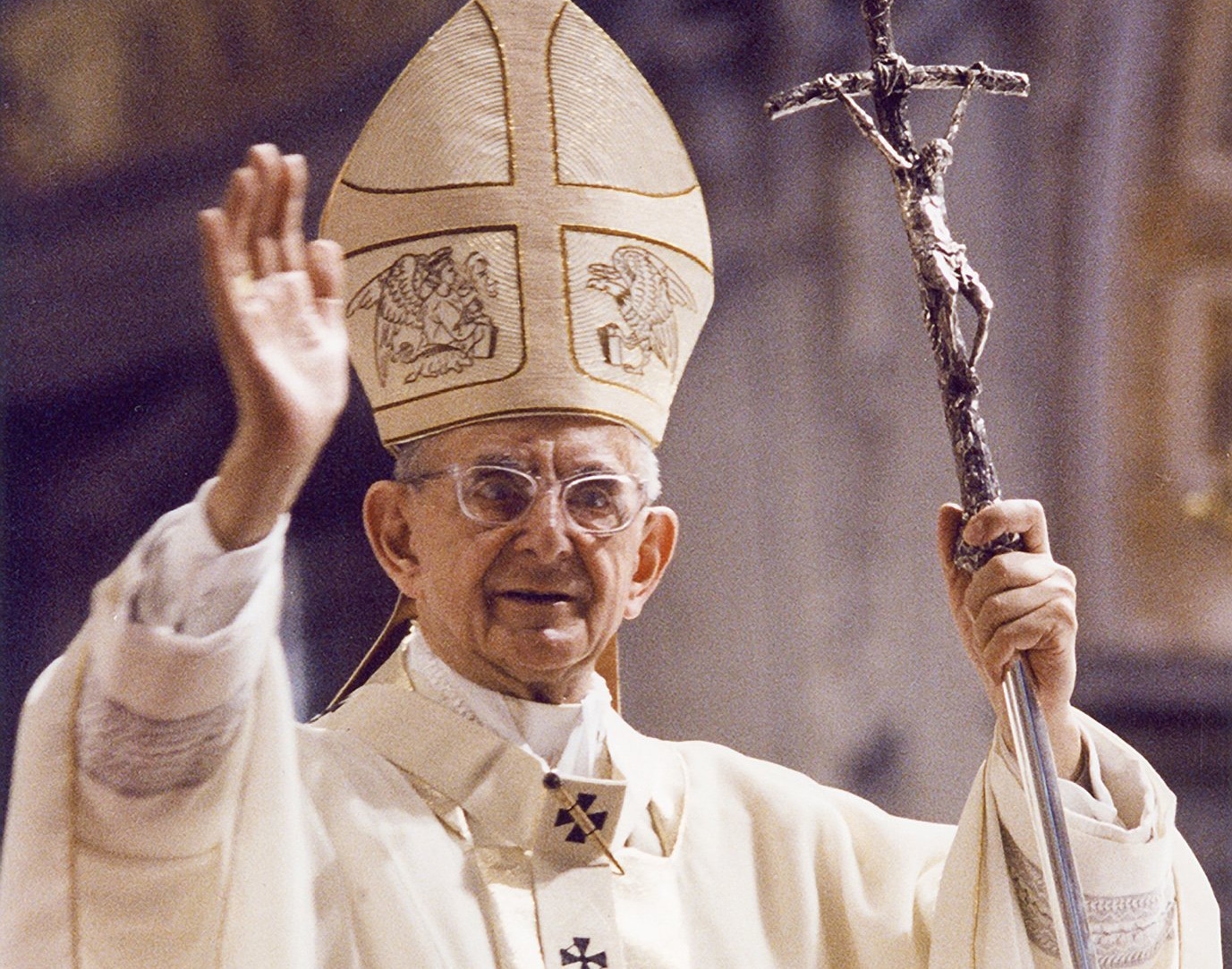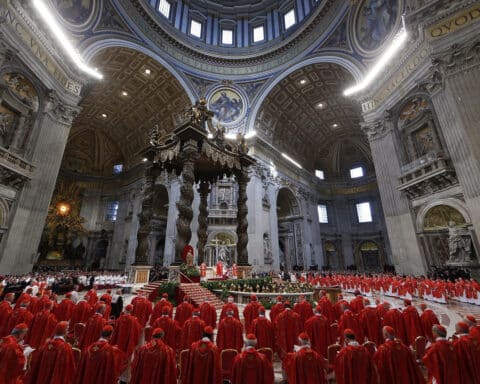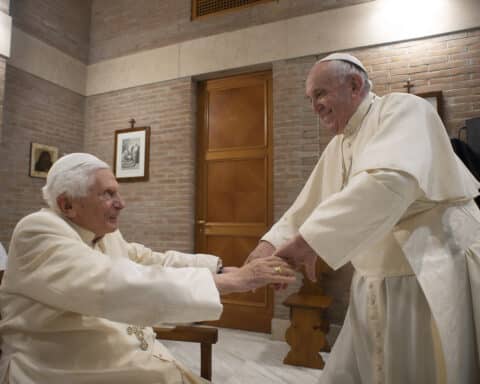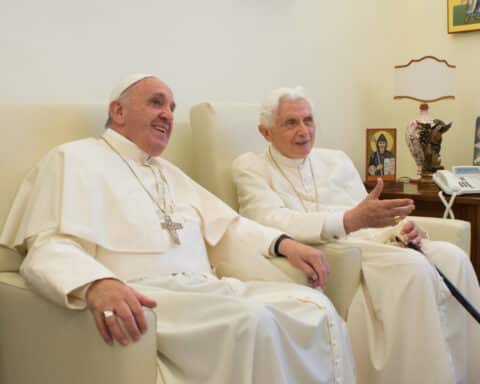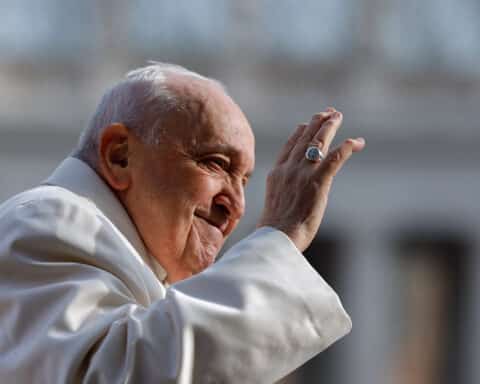If, as I expect, there is a reward in heaven for doing your duty, Pope Paul VI’s heavenly reward must be great indeed. For this was a pope who at the turning point of his pontificate not only did his duty but, thereafter, paid dearly for having done it.
Perhaps, in a general way, he saw it coming. Six weeks after he was elected pope, he wrote privately, “I was solitary before, but now my solitariness becomes complete and awesome. … My duty is to plan, decide, assume every responsibility, and guide others, even when it seems illogical and perhaps absurd. And to suffer alone. … Me and God.”
By the end, says Irish historian Eamon Duffy, “tribulation had become the element he moved in.” But even so, and despite bearing the weight of the papacy in troubled times, this sensitive, highly conscientious man was moved to write, “I am full of consolation, overcome with joy, throughout every tribulation.” Reading that, one recalls the words of another man named Paul: “For as Christ’s sufferings overflow to us, so through Christ* does our encouragement also overflow” (2 Cor 1:5).
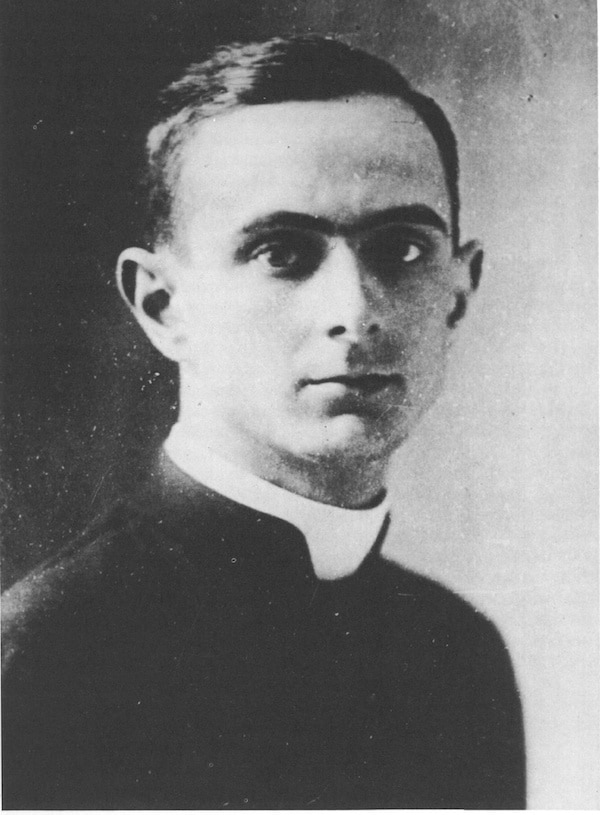
Early life and ministry
Giovanni Battista Montini was born Sept. 26, 1897, in Concesio, a village near Brescia in northern Italy. His father, Giorgio, was a lawyer, journalist, Catholic Action leader and member of the Italian parliament. He entered the seminary in 1916 and was ordained a priest in 1920. In Rome, he studied at the Gregorian University, La Sapienza University, and the “Accademia” where promising young priests were trained for the diplomatic service of the Holy See.
In 1922, he began work in the Vatican. After serving briefly at the papal nunciature in Poland, he returned to Rome and took up duties in the Secretariat of State, where he was to remain until 1954. In 1937, with Cardinal Eugenio Pacelli as Secretary of State, he was named Sostituto for Ordinary Affairs — in effect, Assistant Secretary of State and papal chief of staff. When Cardinal Pacelli became Pope Pius XII in 1939, Msgr. Montini became the pope’s private secretary as well. Later, he was to express deep admiration for Pope Pius, whom he called a man of “great strength and fearless courage.”
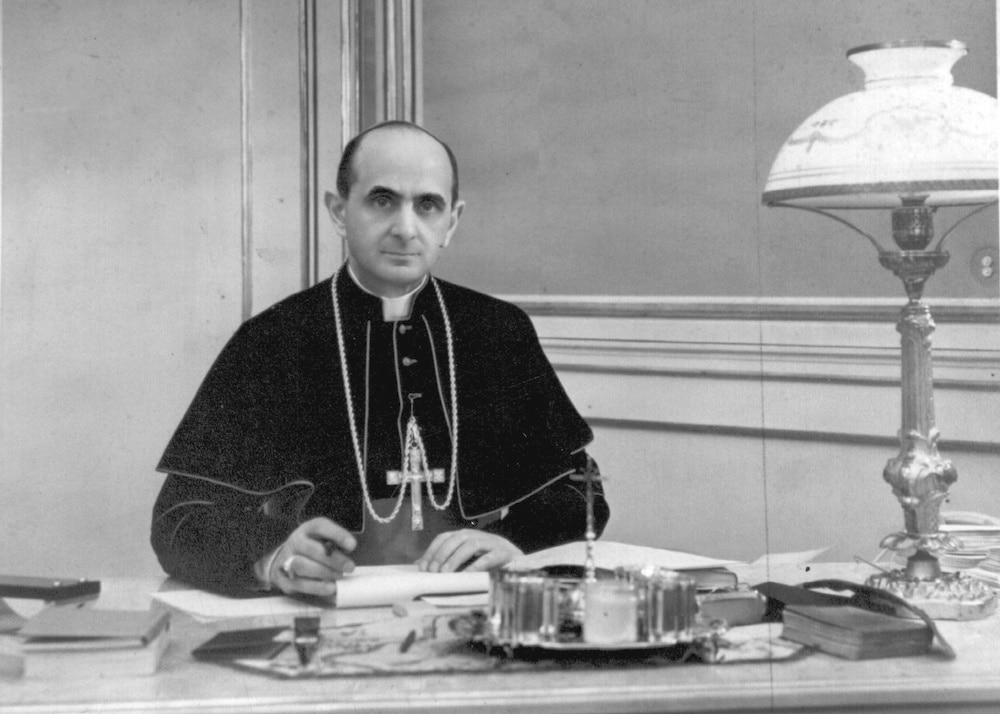
Working at the heart of Vatican affairs during World War II, he headed an information office in the Secretariat of State that fielded requests — nearly 10 million of them in the end — for help in locating and assisting refugees and prisoners of war. During the German occupation of Rome in 1943, he directed Vatican efforts to shelter local Jews from Nazi efforts to round them up for shipment to death camps. Some 4,700 Jews were housed in convents, monasteries and other religious houses around Rome while another 12,000 lived at the papal summer residence in Castel Gandolfo.
In 1954, Pius XII named him to head the giant Archdiocese of Milan, with 1,000 churches, 2,500 priests, and 3.5 million Catholics, one of the world’s largest. In December of 1958, Pope John XXIII made him a cardinal.
Elected pope to succeed John XXIII
The following month, Pope John surprised everyone by announcing a new ecumenical council. Skeptical regarding the council at first. Cardinal Montini nevertheless emerged as a major figure at the Second Vatican Council’s first session in the fall of 1962. Elected on June 21, 1963, to succeed Pope John, he declared that the council should continue, presided over its next three sessions and then turned his attention to working for its implementation.
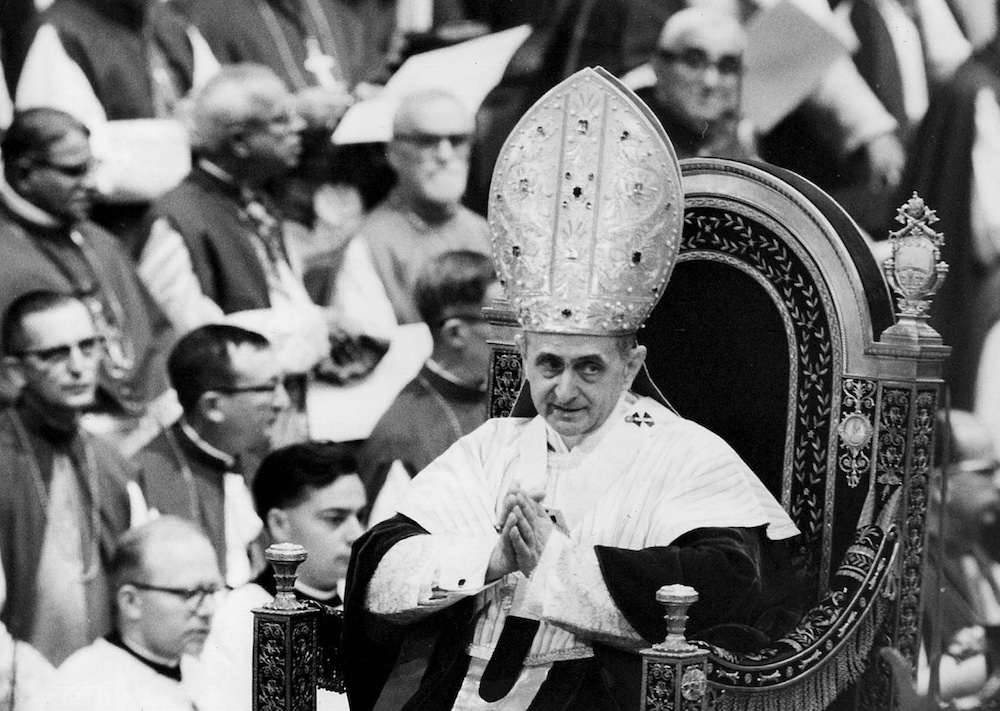
In the early years of his pontificate, Pope Paul enjoyed a number of notable successes. Besides bringing Vatican II to an upbeat conclusion, these included a historic meeting in Jerusalem with the Orthodox Ecumenical Patriarch of Constantinople, followed by steps toward healing the split between Catholicism and Orthodoxy, a dramatic 1965 visit to the United Nations in New York, where he issued an appeal for “No more war,” and an important 1967 social encyclical, Populorum Progressio, aligning the Church with the developing nations.
Open to transmission of life
Then came birth control.
Shortly before he died in 1963, Pope John established a commission on “population, family, and birth rate” to prepare for the Holy See’s preparation in an international conference. Early in the game, however, the commission added new members and expanded its mandate to include questions about contraception, including whether the recently introduced birth control “pill” was morally acceptable.
Maneuvering rapidly intensified within the commission — now universally known as the “birth control commission” — as well as among interested outside parties. In October 1966, Paul took some of the wind out of the sails of the forces pushing for approval of contraception by saying the matter involved issues that lay beyond the competence of the commission. Even so, in the spring of 1967 internal documents — misnamed the “Majority Report” (favoring contraception) and “Minority Report” (opposing) — were leaked to selected media in an obvious attempt to pressure the pope into deciding for change.
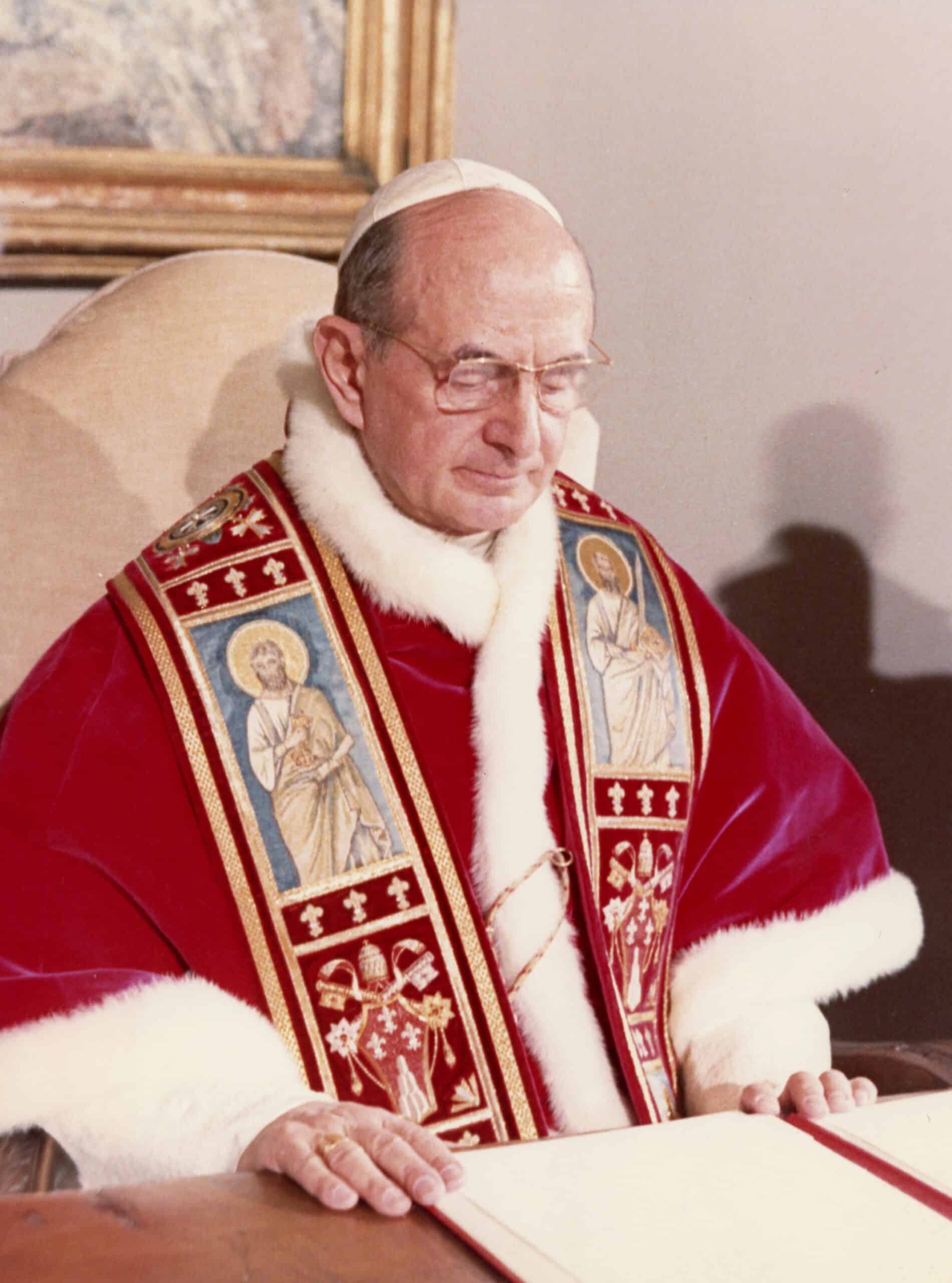
Then, on July 25, 1968, Paul VI issued the encyclical Humanae Vitae. “Each and every marital act must of necessity retain its intrinsic relationship to the procreation of human life” (No. 11), he declared.
Humanae Vitae has been praised as a prophetic document for having anticipated the destructive consequences of widespread acceptance of contraception including “conjugal infidelity and the general lowering of morality.” But the immediate reaction to the encyclical was a wave of dissent. The pope stood firm — and suffered for it.
In some ways, the encyclical could hardly have come at a worse time — at the crest of a cultural revolution, itself largely a revolution in sexual morality that swept through both society and the Church. In the United States and other Western countries, priests and religious in large numbers were abandoning the priesthood and religious life while new vocations plummeted. Mass attendance had begun to drop. Ordinary Catholics appeared alienated and confused. Matters reached the point that, in a homily on June 29, 1972, Paul declared that “the smoke of Satan has entered the temple of God.”
Spreading the Gospel to the world
These troubled years did include some papal highlights. One was the publication in December 1975, of Paul VI’s document on evangelization, Evangelii Nuntiandi. Here was a sophisticated yet inspirational message that set the stage for a renewed emphasis on spreading the Gospel to a world described as “buoyed up by hope but at the same time oppressed by fear and distress.”
But the pope’s last years were marked by sadness and tragedy, including the kidnapping by left-wing terrorists of Christian Democratic leader Aldo Moro, an old friend of his. Paul VI pleaded publicly for Moro’s release but to no avail. The terrorists killed him, and Paul, in his last public act, presided at his funeral. Soon after, while resting at Castel Gandolfo, he suffered a massive heart attack and died on Aug. 6, 1978. He was canonized by Pope Francis on Oct. 14, 2018.
In private notes, Paul VI once asked, “Am I Hamlet or Don Quixote?” The conflict this implied — between the idealist and the man tortured by uncertainties — was indeed part of his makeup. But his legacy can better be found in the closing words of Humanae Vitae — the encyclical about which he thought so long and which itself was the turning point of his pontificate. After speaking of “the work of education, of progress and of love” that lay ahead for him and others, Pope Paul concluded:
“Truly a great work, as we are deeply convinced, for the world and for the Church, since man cannot find true happiness — towards which he aspires with all his being — other than in respect for the laws written by God in his very nature, laws which he must observe with intelligence and love.”

